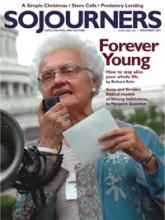In the United States of the 1830s, it was unheard of for a woman to speak publicly to large groups that included men as well as women. Especially if the topic was a burning political issue.
But Maria W. Stewart, a free African-American woman in Boston, suffered social censure rather than defy her faith and conscience. Not yet 30 years old, Stewart stood up to lecture in Boston’s Franklin Hall at a September 1832 anti-slavery gathering of African-American women and men. Her topic: opposition to the “colonization” movement, which sought to ship free blacks and ex-slaves back to Africa rather than redress the wrongs done them. Her opening was blunt and provocative, a call to active resistance: “Why sit ye here and die? If we say we will go to a foreign land, the famine and the pestilence are there, and there we shall die. If we sit here, we shall die. Come let us plead our cause before the whites: if they save us alive, we shall live—and if they kill us, we shall but die.”
Then she makes a brief aside, so timed, one assumes, to answer the grumblings her boldness of speech would elicit from some. “Methinks I heard a spiritual interrogation—‘Who shall go forward, and take off the reproach that is cast upon the people of color? Shall it be a woman?’ And my heart made this reply—‘If it is thy will, be it even so, Lord Jesus!’”
Having claimed the only credential that by her standards mattered, Stewart returned to her lecture.
Read the Full Article

